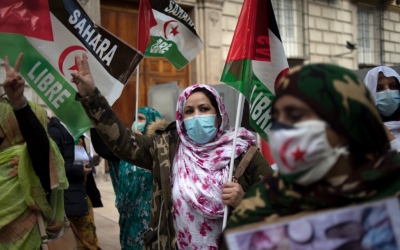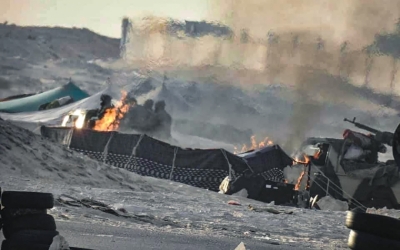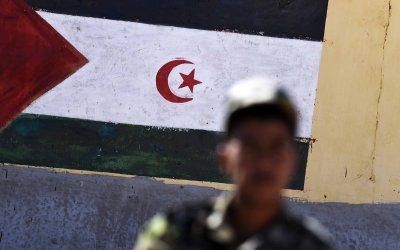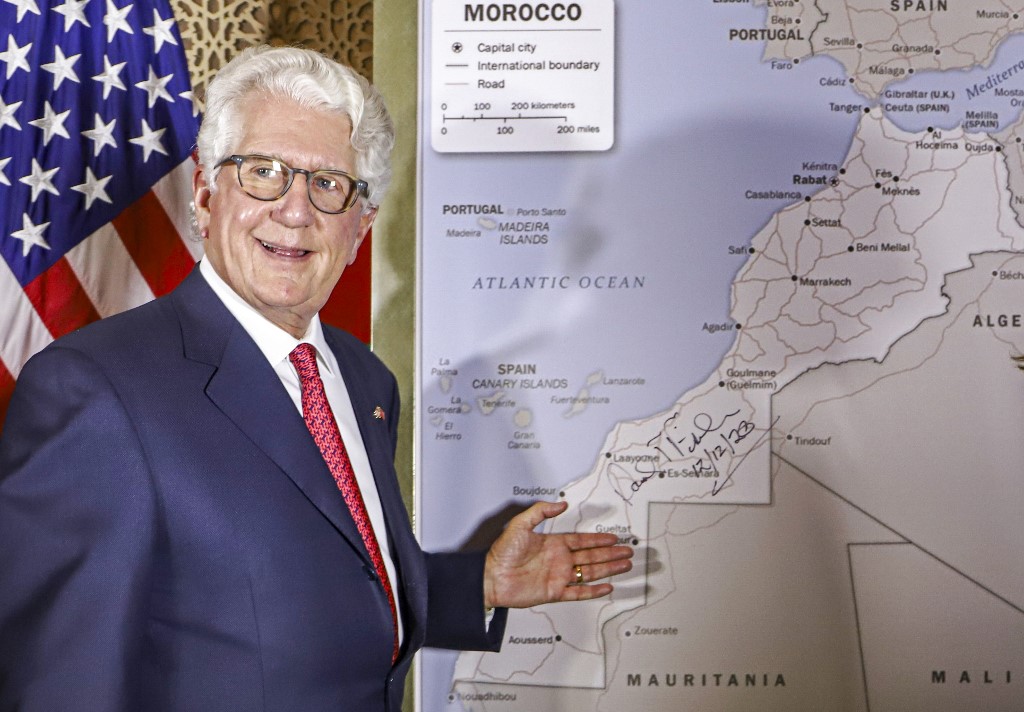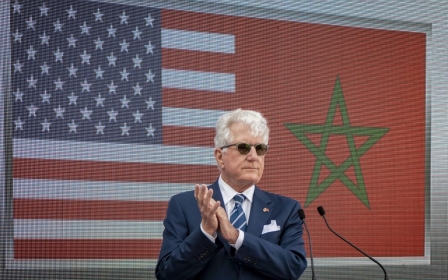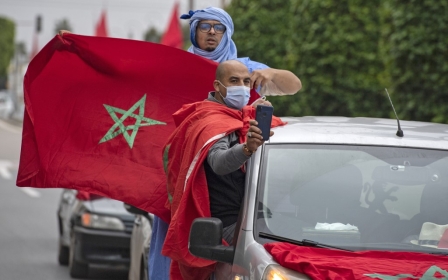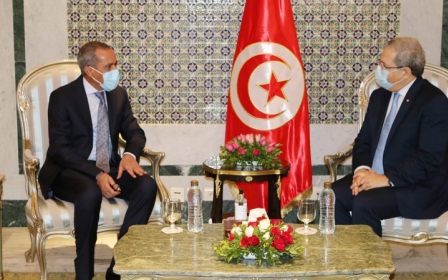Sahrawi activists and Moroccan dissidents fear Rabat is now pursuing them abroad
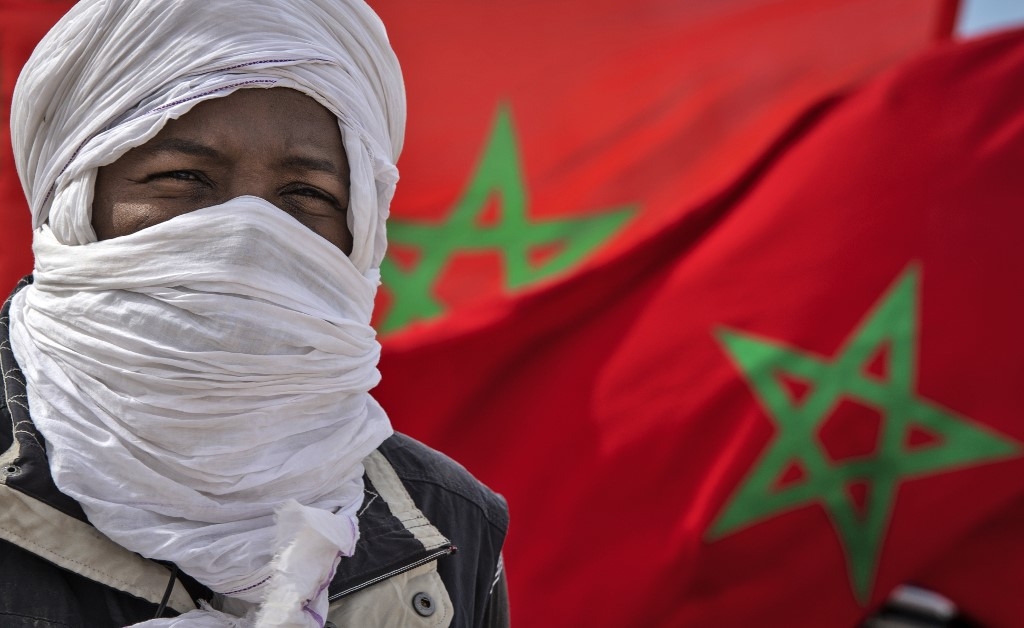
A recent crackdown on press freedom in Western Sahara may be a prelude to attempts to silence dissidents abroad taking advantage of Morocco's Washington-backed rapprochement with Israel, a number of activists have told Middle East Eye.
Three Moroccan security agencies, including the General Directorate for Territorial Surveillance commonly referred to as the DGST, have allegedly filed a request to the first instance tribunal in Rabat to sue Moroccan nationals abroad over alleged defamation of government officials.
'This sends a chilling message to all Moroccans living abroad that even though they live in faraway countries that protect freedom of expression, the Moroccan state will still find ways to target and intimidate them,'
- Samia Errazougi, Moroccan-American journalist
According to a report by the Spanish El Pais, the complaint has been filed against “individuals who reside abroad and insult public personalities who exercise their duties.”
The paper did not provide details about the identity of those who may be affected by the complaints. It also did not specify the judicial mechanism abroad that will allow these complaints to be legally processed, taking into account that there are several countries and legal frameworks involved.
The Moroccan government has yet to confirm the report, but activists abroad say they are already bearing the brunt of their anti-government speech, and that they foresee more repression ahead.
New MEE newsletter: Jerusalem Dispatch
Sign up to get the latest insights and analysis on Israel-Palestine, alongside Turkey Unpacked and other MEE newsletters
One of them is Mohamed Radi Ellili, a former journalist at the Moroccan national TV and an asylum holder in France.
“The Moroccan king is very angry at the free voices active outside Morocco,” Ellili, who is one of the most active critics of the Moroccan government, told Middle East Eye.
"He led a local campaign to silence activists, and specially targeted me with some 400 videos published by state-sponsored platforms accusing me of treason and being an Algerian agent,” he said.
Ellili has established his own platform, News Monde, to speak out about alleged corruption overseen by state officials.
Ellili claims that the issues he highlights on his live Facebook shows and his writings expose state policies to create a new demographic reality in the Western Sahara region.
“The reason they put me under their telescope is my work exposing corruption cases in the province of Wadnoun, and even a drug traffic cartel where several officials have been involved, and their plans in Western Sahara,” Ellili said.
End of a ceasefire
Often described as Africa's last major colony, Western Sahara is a former Spanish colony on the Atlantic coast of Africa between Morocco and Mauritania.
Spain withdrew from the territory in 1975, handing over administrative control of two-thirds of the territory to Morocco, while Mauritania received a third - a move not recognised by international law.
The region is believed to have significant offshore oil reserves and mineral resources. Its indigenous Sahrawi population, estimated to be between 350,000 and 500,000, has fiercely rejected Moroccan control, and between 1975 and 1991 the Polisario Front fought an insurgency against Rabat's presence.
Polisario has long called for the Sahrawi’s right to a referendum on independence, something that has also been promised by UN resolutions.
Polisario has repeatedly accused Morocco of exploiting the region's natural resources while half of its population await a referendum in camps and in exile.
The Moroccan government, meanwhile, refers to the Polisario Front as terrorists and says that they have "enslaved" the Sahrawi people.
The decades-long territorial conflict in Western Sahara was reignited in November after Moroccan forces and Polisario fighters clashed over a protest blocking a highway into Mauritania, with the Sahrawi movement declaring the 1991 ceasefire over.
Moroccan authorities then launched a crackdown on pro-independence activists, with security forces forcibly dispersing protests and detaining several activists who expressed opposition to Moroccan rule. The Sahrawi protests were predominantly peaceful, according to Human Rights Watch.
‘A chilling message’ to dissidents
The request by the highest intelligence services to pursue journalists and activists abroad, if true, is extremely alarming for Ellili.
“I advise my fellow activists and journalists to inform their local authorities of any threats. I personally received many threats and have sought police protection, but that has not been provided yet. I also do not rule out assassination attempts,” Ellili said.
Samia Errazougi, a Moroccan-American journalist who is a former correspondent for the Associated Press in Rabat, believes that this decision will worry dissident voices abroad who have families back home.
She argues that it could send a message that the Moroccan state seeks to use power to silence those voices even away from home.
“The most significant consequence is that Moroccan dissidents residing abroad will now have to worry about the risks of arrest or charges when they return to Morocco,” Errazougi told MEE.
“This sends a chilling message to all Moroccans living abroad that even though they live in faraway countries that protect freedom of expression, the Moroccan state will still find ways to target and intimidate them,” she added.
Elilli says he is already paying the price of his online criticism of the Moroccan government.
He claims that a state-sponsored YouTube channel filmed an interview with his family in his home in December to compel them to testify that they oppose his political views.
Morocco emboldened by Israel deal
The boost in Moroccan-Israeli relations reached a peak recently when the administration of US President Donald Trump facilitated Morocco’s normalisation deal with Israel, which was later followed by an official American diplomatic visit to prepare for the opening of a consulate in the Western Sahara Dakhla region.
Meanwhile, there have been mounting fears since a revelation by Amnesty International in June last year about the involvement of Israel’s spyware firm NSO and its Pegasus system in the detention of Moroccan journalist Omar Radi, who is still awaiting trial behind bars.
Hicham Mansouri, a former project officer at the Moroccan Association for Investigative Journalists (MAIJ) and an asylum holder in France, believes that the Moroccan-Israel deal has emboldened Morocco to take steps to silence critical voices overseas.
“The context of the Israel-Morocco normalisation of relations has contributed to the increasing intensity of oppression, as the Moroccan regime is afraid of popular anger against compromising the Palestinian issue,” Mansouri told MEE.
Mansouri also believes that the arrest of an outspoken activist like Maati Monjib was a reflection of the authorities’ fear of criticism being heard abroad.
“I have known Maati since 2009 and we worked together for the MAIJ, where we talked about sensitive issues like the royal monopoly of the economy. But this was not the only reason Monjib was arrested," Mansouri said.
"The fact that he publishes in three languages - Arabic, French and English - made his work reach an international audience, which has caused the authorities to target him,” he added.
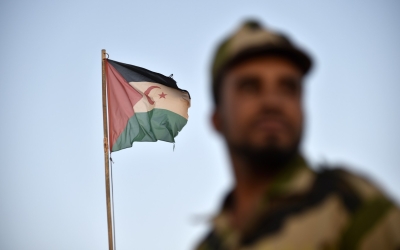
As the Israel-Morocco deal seems to be influencing the recent crackdown, Errazougi sees that there is a broader context to it.
“The deal is part of a broader pattern of Morocco getting away with arresting journalists and activists with little or no accountability on the international level,” she said. Morocco has been treated as “a security partner by the Trump administration and EU governments who are willing to turn a blind eye to the abuses taking place under the Moroccan state, similar to Egypt and Saudi Arabia.”
Following Trump’s announcement, activists in Western Sahara told MEE they felt increasingly unsafe, as the agreement amounted to “a green light” for Moroccan “military occupation” of the region.
Despite all the above, with all eyes on Joe Biden's inauguration that will take place in less than ten days, Errazougi sees light at the end of the tunnel.
“The incoming Biden administration will hold a unique position in breaking away from the diplomatic precedent set by the Trump administration, which has largely helped authoritarian practices throughout the region.”
This article is available in French on Middle East Eye French edition.
Middle East Eye delivers independent and unrivalled coverage and analysis of the Middle East, North Africa and beyond. To learn more about republishing this content and the associated fees, please fill out this form. More about MEE can be found here.


